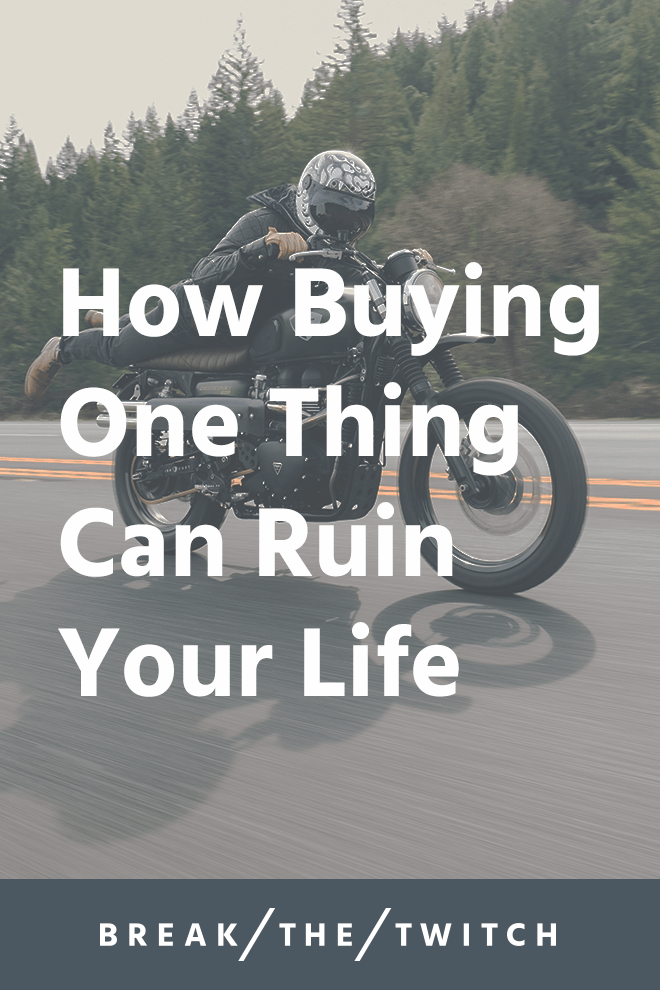
Click.
In two days, there will be a box sitting on your front porch and it may be the one thing that’s going to ruin your life.
It’s funny to think that such a small, seemingly harmless movement–the click of a mouse–could be so damaging. I bet it doesn’t even burn 1/5th of a calorie doing it.
So you spent $23 on a new phone case that you didn’t really need. So what?
It would be good marketing for me to tell you that you shouldn’t have bought it, you’re not a real minimalist, and you need to buy my $40 course in order to solve your ‘twitch’ problem. Well, the truth is, none of those things are necessarily true, and that one purchase probably isn’t going to ruin your life.
When I was in my hardcore daily-Amazon-twitch phase, I never really ordered much over $20-30. I can’t say that any one purchase over the course of those four years pushed me over the edge, either.
It wasn’t any one purchase because our brains have a tendency to not notice small, continuous changes over long periods of time. Especially with the consistency of routine and weekly work schedules, those small changes tend to go unnoticed. But just because we don’t see it doesn’t mean it’s not actually happening.
Month after month the things we purchase begin to accumulate, the time we spend organizing, cleaning, and dealing with those possessions increases, and the lives we believe ourselves to live slowly fades from reality. We get used to spending several hours of our work week earning money used exclusively for the purchase of things that end up… taking even more of our time and money–how crazy is that?
Thanks to hedonic adaptation–how humans quickly return to a relatively stable level of happiness despite major positive or negative events or life changes–that constant quasi-stress, overbooked schedule, monthly financial struggle, and chronic sleep deprivation just become the new normal. We simply adjust to it.
After pulling four years of my online purchase history, and calculating the totals spent over the course of those years, it finally all hit me.
I already had the life I so desperately wanted. That life was crammed away in drawers, closets, bookshelves, and buried in basement boxes. Hundreds of small online purchases that, for what I spent on them, could have added so much actual value to my life.
Perhaps an extra car payment to pay down the loan faster, a few extra shares of mutual fund investments, or a flight to visit an old friend in another state. Maybe a few hours per week spent writing, building an online business, or working on a side project that could help build the freedom to do more of what mattered to me, instead of organizing the basement–again.
So will that one purchase ruin your life? Probably not. But there is one thing to consider as you go forward in making decisions about what to bring into your life and what to leave out of it:
Is this a creator or a taker?
Creator: Allows you to create more time and have more energy for the important things in your life. They provide future efficiency, measurable return on investment, and continue to create value in your life. Creators tend to return more time, happiness, or energy than was taken to acquire them. They would be considered good investments whether financial or intangible.
- Does it help create more time than it took to earn the money to acquire?
- Does it help generate income that frees up future time?
- Does it align with your values and what you want out of life?
- Does it bring joy, happiness, or fulfillment to your life?
Taker: Requires more time to maintain, financial investment to upkeep, or energy to store and organize. The worst kinds of takers are a double dose of energy drain–they take your time to earn the money required to purchase them, then they continue to take your time as you continue to own it.
- Does it create more freedom and flexibility in life?
- Does this take up space that we need to pay money for (storage units)?
- Does it require spending more money or time to maintain?
- Does this help get closer or put us further away from our lifestyle goals?
Overall, most of these questions will get you to the outcome that you’re looking for. Truly, it’s not any one purchase that does the damage, but the collective result of many that end up positioning our lives in away that we did not intend.
There are two specific examples that came into my life recently that I’d love to share with you.
One example of a creator, is the relatively expensive DSLR camera that we purchased to shoot photos and film my YouTube videos with. I can legitimately say that having that particular piece of equipment has significantly improved the quality of my videos, and I even enjoy making them more because of it. Additionally, it has allowed me to take on other opportunities that have a significant ROI both of life hours and earning potential.
A taker? Simply two books that I ordered that I wasn’t ready to read them. As small as it may seem, I spent money on them, then they sat in my nightstand taking up space for the next two months. This was when I created my finish-it-or-pitch-it book rule, and stopped wasting money on books I wouldn’t end up reading for months. While it might only be $10 or $20 for the books, it’s a great example of a small thing that slowly compounds over time with other purchases.
That brings us to my final thought: when you make the right decision time after time, the results begin to compound. The more frequently you focus on only having things that create time, create space, and have a net positive effect on your life, the more they will stack. To the contrary, the more things you have that take away energy compound in a negative fashion.
You can use this to your advantage, or you can let the things you own, own you and your time.

